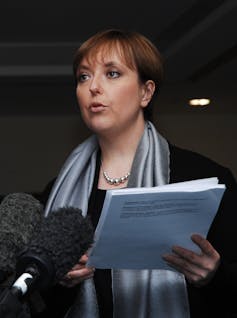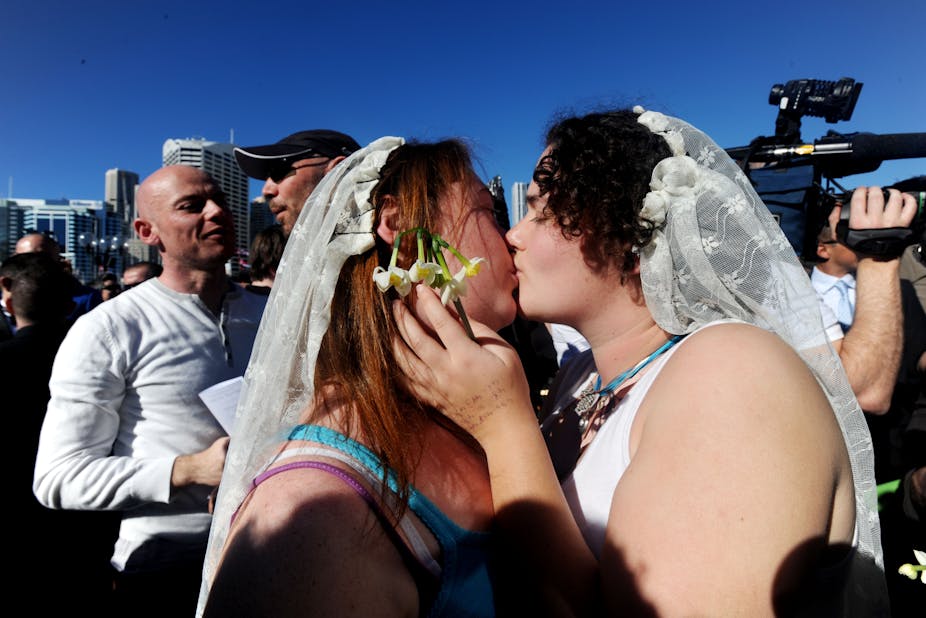Does the Tasmanian Parliament have the power to pass a law permitting same-sex marriage? The short answer is yes. But the more difficult question is whether that law will be effective or whether it will be inoperative because it is inconsistent with a Commonwealth law.
The answer to this question is unclear and unknowable until the High Court decides, but we can take a look at the issues the High Court will confront.
The constitutional meaning of marriage
Assuming that the constitutional validity of the Tasmanian law will be challenged, the High Court will ultimately have to decide two questions.
The first is whether the Commonwealth Parliament’s constitutional power to make laws with respect to “marriage” extends to the marriage of same-sex couples. This would depend upon whether the court took an originalist approach – looking at what “marriage” meant when the Constitution was enacted (which would be likely to exclude same-sex marriage) – or whether it took a non-originalist approach based upon changing contemporary standards and the meaning of the term “marriage” today.
Even if it took the latter course, difficult questions would arise as to how much community support is needed to change the meaning of a word and what evidence this must be based upon. The answer is not cut and dried.

If the court decided that “marriage” in the Constitution did not include same-sex marriage, then there would be no issue of a conflict between State and Commonwealth laws.
While the Commonwealth Parliament can only make laws on specific subjects listed in the Constitution, the states have full legislative power to make laws on any subject as long as it is not taken away from them by the Commonwealth Constitution. So if the Constitution only permitted the Commonwealth to make laws in relation to marriage in its traditional sense, this would not stop the states from making laws about other forms of marriage.
The only question would be whether these other unions could still be described as “marriage” if they are outside the constitutional meaning of that term.
If, on the other hand, the High Court held that the Commonwealth can make laws with respect to both opposite-sex and same-sex marriage, then it would have to decide whether there was an inconsistency between any state law on marriage and the Commonwealth’s marriage law. If there was an inconsistency, then the Commonwealth law would prevail and the state law would be inoperative to the extent of the inconsistency.
Inconsistency between marriage laws
The Commonwealth’s Marriage Act 1961 states in section 5:
“marriage” means the union of a man and a woman to the exclusion of all others, voluntarily entered into for life.
It then sets out the requirements for all marriages solemnised in Australia, the pre-conditions for marriage and the circumstances in which marriages are invalid.
The question would be whether the proposed Tasmanian law would be inconsistent with the Marriage Act. This would depend upon the wording of the Tasmanian law. If the Tasmanian law purported to give to same-sex couples the legal status of being “married” for the purposes of all law across Australia, including Commonwealth law, this would be likely to give rise to a direct inconsistency with the Marriage Act, as it would be purporting to grant people a status which is denied to them by a Commonwealth law. It would therefore be inoperative to the extent of this inconsistency.
If the Tasmanian law was drafted so as to confine its effects to Tasmanian laws, it might still be held to be inconsistent with the Commonwealth’s Marriage Act to the extent that the Commonwealth law was regarded as “covering the field” of marriage.
The Marriage Act confines its definition of marriage to opposite-sex couples, so Tasmania would argue that it left the field open for state legislation with respect to other types of marriage.
Those opposing the Tasmanian law would be likely to argue that it was intended to cover the entire field of marriage within Australia and to prohibit marriage of same-sex couples. For example, section 88EA of the Marriage Act says that a union solemnised in a foreign country between a man and another man or a woman and another woman must not be recognised as a marriage in Australia.
The effect of a Tasmanian marriage law
A Tasmanian law permitting same-sex marriage, even if operative, would do little more than facilitate holding a ceremony, drinking champagne and taking photos. It might confer on the parties to a same-sex marriage the status of “married” for the purposes of Tasmanian laws, but it is most unlikely that they would be regarded as legally “married” for the purposes of Commonwealth law or under the law of any other state (unless that state legislated to recognise the status conferred by the Tasmanian law).
It would therefore not attract any legal benefits or status accorded to a married couple outside of those given under Tasmanian law.
There is also a distinct possibility that such a law would be held to be inoperative because it is inconsistent with a valid Commonwealth law. All in all, it is not time for same-sex marriage proponents to crack open the champagne yet.

